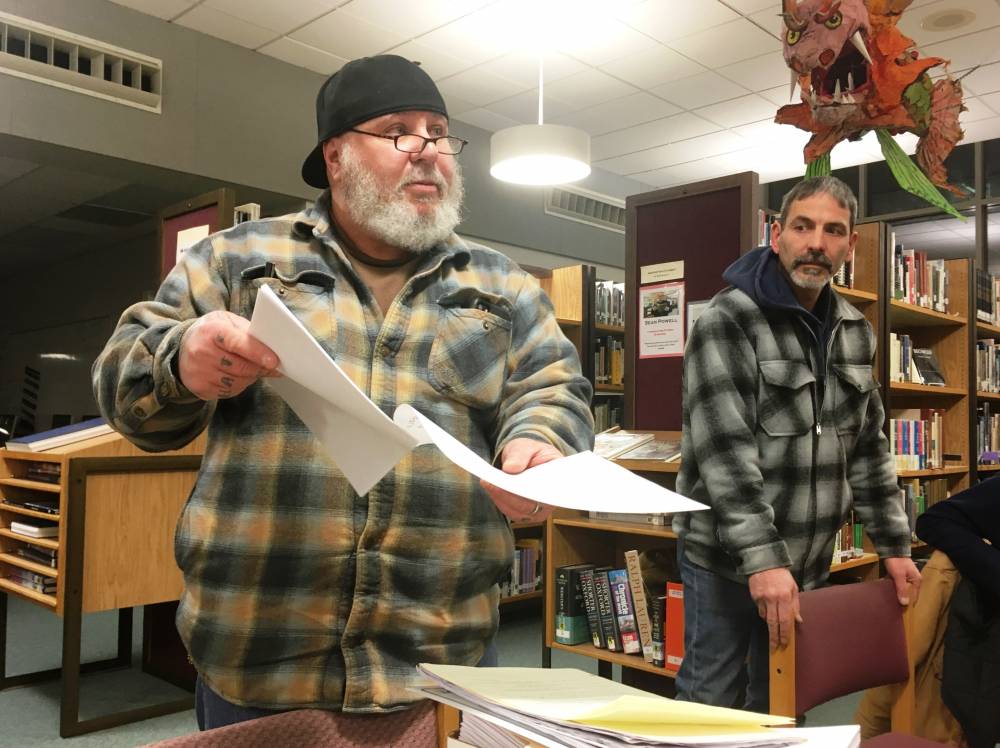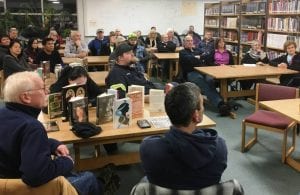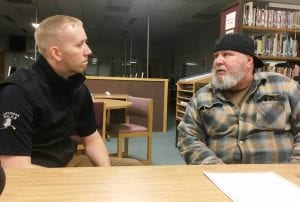
Terry Miles, left, and Paul Bermudez have organized Ketchikan’s first Neighborhood Watch, for the area of lower Jackson Street and Upper Monroe. The group had an informational meeting on Wednesday at the Ketchikan High School library. (KRBD photo by Leila Kheiry)
In response to an uptick in home burglaries throughout Ketchikan, a group has formed the city’s first neighborhood watch organization. The Upper Monroe/ Lower Jackson neighborhood watch gathered for an informational meeting Wednesday evening.
Terry Miles and Paul Bermudez are neighbors, and they both recently got hit by thieves. Someone stole tools, equipment and CDs from their trucks. Miles said whoever it was tried breaking into their houses, too.
“We were doing what everybody else does: Get on social media and scream about it,” he said. “But we decided to do something about it. Neighborhood watch was, we thought, the answer to the problem. Or at least part of the solution.”
The two met with local police to learn how to put together a neighborhood watch, and then went door-to-door in their chosen area to spread the word, gather information and introduce themselves to any neighbors they hadn’t yet met.
Miles and Bermudez said they would have been happy if 10 people showed up to their meeting. It was closer to 40.

Between 30 and 40 people attended an informational meeting about Ketchikan’s first Neighborhood Watch. The meeting took place at the Kayhi library. (KRBD photo by Leila Kheiry)
“We’re going to get rockin’ and rollin’ here,” Miles said to the group as the meeting began. “My name is Terry Miles. This is my neighbor, Paul Bermudez. We’re the ones who started this Upper Monroe, Lower Jackson Street neighborhood watch.”
The area also includes Lincoln Street, Lincoln Court, and Clinton Court.
The two had a packet of information for people on those streets, with a list of neighbors and phone numbers, so they can easily reach each other if they see or suspect a problem.
Ketchikan Police Lt. Andy Berntson attended the meeting to answer questions and give a presentation. He said the neighborhood watch program belongs to the neighborhood, and the biggest benefit could be simply deterring crime.
“Deterrence is obviously what you’re hoping to accomplish by putting this program out there, hanging the signs, letting people know, ‘Hey, we’re literally watching you with our signs, we’re watching from our windows, we’re watching from our homes,’” he said.

Lt. Andy Berntson, left, talks with Terry Miles before Wednesday’s informational meeting about a new Neighborhood Watch. (KRBD photo by Leila Kheiry)
Taking action is another step. That starts with “paying attention. Who are my neighbors? Go introduce myself. What is normal for my neighborhood? I don’t have lights – every time I look out in my driveway, I think I see shadows. Well, put a spotlight out there. Light up your neighborhood.”
And, Berntson said, lock your doors – cars and homes. He said most crimes that have been reported are crimes of opportunity. An unlocked vehicle, front door or window provides easy access. And thieves like easy.
“There’s no train of – when you’re dealing with the mind of an addict, there’s not always a real train of thought past that moment,” he said. “That’s what you gotta realize with the spontaneity of a lot of these crimes. These are not well-developed plots. But the victim is still victimized the same – I’m not making light of the situation.”
Often, he said, these crimes are committed by people stealing to feed a drug addiction.
If someone sees something suspicious, they can call the police station’s business line. If something illegal is happening right now, Berntson said, call 911. That line is a priority.
He said social media isn’t a priority for police. Facebook can be a good tool for the neighborhood watch group, though, if used correctly.
“A good rule for how those kind of pages would be used would be, as an example, ‘This vehicle was idling outside my house for two hours. Is that normal?’ No, that’s fantastic information for us to have, that’s great to put on a Facebook page,” he said.

The Ketchikan Police Department’s business line is 907-225-6631. To report a crime anonymously, people can call the Crime Stoppers line at 907-225-2583. (KRBD photo by Leila Kheiry)
And people can post about crimes after they’ve called the police.
“A lot of information we get out of that theft reporting page is, ‘This just went on. I hope the police do something about it,’” he said. “The next comment is, ‘Well, have you called the police?’ That would be a fantastic idea.”
There’s a Facebook group called Ketchikan Theft Reporting, with more than 2,000 members.
Miles said a bonus benefit of the neighborhood watch is simply getting to know neighbors better.
“Don’t hesitate to go over to your neighbor’s house and say, ‘Hey, can I get your contact information?’ Talk to them when they’re going to be out of town and somebody is going to be watching their house,” he said. “Or you, if you’re going to be out of town and somebody is going to be watching your house, let your neighbors know. It’s as simple as doing stuff like that and keeping everybody aware of what’s going on with our neighbors.”
Because neighbors paying attention is the whole point of a neighborhood watch.
The Ketchikan Police Department has information for anyone interested in starting a neighborhood watch program for their own neighborhood.








